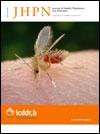Post-production Losses in Iodine Concentration of Salt Hamper the Control of Iodine Deficiency Disorders: A Case Study in Northern Ethiopia
DOI:
https://doi.org/10.3329/jhpn.v28i3.5550Keywords:
Cross-sectional studies, Iodine, Iodine deficiency, Salt, EthiopiaAbstract
Iodine is essential for good function of the thyroid, and its deficiency is of public-health importance inEthiopia. Iodization of salt is an effective and sustainable strategy to prevent and control iodine deficiency
in large populations. The effectiveness of salt-iodization programmes depends on the conservation of iodine
concentration in salt at various stages of the supply-chain. The overall objective of the study was to
assess the loss of iodine in salt from production to consumption and to estimate the proportion of adults,
especially pregnant women, at risk of dietary iodine insufficiency. A cross-sectional study was conducted
during February-April 2007 in northern Ethiopia. Iodine concentrations of salt samples from producers
(n=41), retailers (n=7), and consumers (n=32) were determined using iodiometric titration. A risk assessment
was conducted for dietary iodine insufficiency among adults, including pregnant women, using
a semi-probabilistic approach. The concentration of iodine in the sampled salts decreased by 57% from
the production site to the consumers. The assessment of exposure showed that adults in 63% (n=20) of
the households, including 90% (n=29) with pregnant women, were at risk of insufficient iodine intake. A
monitoring and evaluation system needs to be established to ensure adequate supply of iodine along the
distribution chain. Special attention is needed for the retailers and consumers. At these levels, dissemination
of information regarding proper storage and handling of iodized salt is necessary to address the reported
loss of iodine from salt.
Key words: Cross-sectional studies; Iodine; Iodine deficiency; Salt; Ethiopia
DOI: 10.3329/jhpn.v28i3.5550
J HEALTH POPUL NUTR 2010 Jun;28(3):238-244
Downloads
Download data is not yet available.
Abstract
258
258
PDF
276
276
Downloads
How to Cite
Shawel, D., Hagos, S., Lachat, C. K., Kimanya, M. E., & Kolsteren, P. (2010). Post-production Losses in Iodine Concentration of Salt Hamper the Control of Iodine Deficiency Disorders: A Case Study in Northern Ethiopia. Journal of Health, Population and Nutrition, 28(3), 238–244. https://doi.org/10.3329/jhpn.v28i3.5550
Issue
Section
Original Papers

